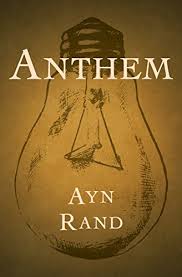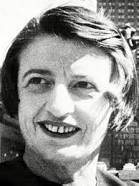Anthem Page #11
Anthem is a dystopian fiction novella by Russian-American writer Ayn Rand, written in 1937 and first published in 1938 in the United Kingdom. The story takes place at an unspecified future date when mankind has entered another Dark Age.
their brother Scholars voted against them, they abandoned their ideas, as all men must.” “This box is useless,” said Alliance 6-7349. “Should it be what they claim of it,” said Harmony 9-2642, “then it would bring ruin to the Department of Candles. The Candle is a great boon to mankind, as approved by all men. Therefore it cannot be destroyed by the whim of one.” “This would wreck the Plans of the World Council,” said Unanimity 2-9913, “and without the Plans of the World Council the sun cannot rise. It took fifty years to secure the approval of all the Councils for the Candle, and to decide upon the number needed, and to re-fit the Plans so as to make candles instead of torches. This touched upon thousands and thousands of men working in scores of States. We cannot alter the Plans again so soon.” “And if this should lighten the toil of men,” said Similarity 5-0306, “then it is a great evil, for men have no cause to exist save in toiling for other men.” Then Collective 0-0009 rose and pointed at our box. “This thing,” they said, “must be destroyed.” And all the others cried as one: “It must be destroyed!” Then we leapt to the table. We seized our box, we shoved them aside, and we ran to the window. We turned and we looked at them for the last time, and a rage, such as it is not fit for humans to know, choked our voice in our throat. “You fools!” we cried. “You fools! You thrice-damned fools!” We swung our fist through the windowpane, and we leapt out in a ringing rain of glass. We fell, but we never let the box fall from our hands. Then we ran. We ran blindly, and men and houses streaked past us in a torrent without shape. And the road seemed not to be flat before us, but as if it were leaping up to meet us, and we waited for the earth to rise and strike us in the face. But we ran. We knew not where we were going. We knew only that we must run, run to the end of the world, to the end of our days. Then we knew suddenly that we were lying on a soft earth and that we had stopped. Trees taller than we had ever seen before stood over us in great silence. Then we knew. We were in the Uncharted Forest. We had not thought of coming here, but our legs had carried our wisdom, and our legs had brought us to the Uncharted Forest against our will. Our glass box lay beside us. We crawled to it, we fell upon it, our face in our arms, and we lay still. We lay thus for a long time. Then we rose, we took our box and walked on into the forest. It mattered not where we went. We knew that men would not follow us, for they never enter the Uncharted Forest. We had nothing to fear from them. The forest disposes of its own victims. This gave us no fear either. Only we wished to be away, away from the City and from the air that touches upon the air of the City. So we walked on, our box in our arms, our heart empty. We are doomed. Whatever days are left to us, we shall spend them alone. And we have heard of the corruption to be found in solitude. We have torn ourselves from the truth which is our brother men, and there is no road back for us, and no redemption. We know these things, but we do not care. We care for nothing on earth. We are tired. Only the glass box in our arms is like a living heart that gives us strength. We have lied to ourselves. We have not built this box for the good of our brothers. We built it for its own sake. It is above all our brothers to us, and its truth above their truth. Why wonder about this? We have not many days to live. We are walking to the fangs awaiting us somewhere among the great, silent trees. There is not a thing behind us to regret. Then a blow of pain struck us, our first and our only. We thought of the Golden One. We thought of the Golden One whom we shall never see again. Then the pain passed. It is best. We are one of the Damned. It is best if the Golden One forget our name and the body which bore that name. PART EIGHT It has been a day of wonder, this, our first day in the forest. We awoke when a ray of sunlight fell across our face. We wanted to leap to our feet, as we have had to leap every morning of our life, but we remembered suddenly that no bell had rung and that there was no bell to ring anywhere. We lay on our back, we threw our arms out, and we looked up at the sky. The leaves had edges of silver that trembled and rippled like a river of green and fire flowing high above us. We did not wish to move. We thought suddenly that we could lie thus as long as we wished, and we laughed aloud at the thought. We could also rise, or run, or leap, or fall down again. We were thinking that these were thoughts without sense, but before we knew it our body had risen in one leap. Our arms stretched out of their own will, and our body whirled and whirled, till it raised a wind to rustle through the leaves of the bushes. Then our hands seized a branch and swung us high into a tree, with no aim save the wonder of learning the strength of our body. The branch snapped under us and we fell upon the moss that was soft as a cushion. Then our body, losing all sense, rolled over and over on the moss, dry leaves in our tunic, in our hair, in our face. And we heard suddenly that we were laughing, laughing aloud, laughing as if there were no power left in us save laughter. Then we took our glass box, and we went on into the forest. We went on, cutting through the branches, and it was as if we were swimming through a sea of leaves, with the bushes as waves rising and falling and rising around us, and flinging their green sprays high to the treetops. The trees parted before us, calling us forward. The forest seemed to welcome us. We went on, without thought, without care, with nothing to feel save the song of our body. We stopped when we felt hunger. We saw birds in the tree branches, and flying from under our footsteps. We picked a stone and we sent it as an arrow at a bird. It fell before us. We made a fire, we cooked the bird, and we ate it, and no meal had ever tasted better to us. And we thought suddenly that there was a great satisfaction to be found in the food which we need and obtain by our own hand. And we wished to be hungry again and soon, that we might know again this strange new pride in eating. Then we walked on. And we came to a stream which lay as a streak
Translation
Translate and read this book in other languages:
Select another language:
- - Select -
- 简体中文 (Chinese - Simplified)
- 繁體中文 (Chinese - Traditional)
- Español (Spanish)
- Esperanto (Esperanto)
- 日本語 (Japanese)
- Português (Portuguese)
- Deutsch (German)
- العربية (Arabic)
- Français (French)
- Русский (Russian)
- ಕನ್ನಡ (Kannada)
- 한국어 (Korean)
- עברית (Hebrew)
- Gaeilge (Irish)
- Українська (Ukrainian)
- اردو (Urdu)
- Magyar (Hungarian)
- मानक हिन्दी (Hindi)
- Indonesia (Indonesian)
- Italiano (Italian)
- தமிழ் (Tamil)
- Türkçe (Turkish)
- తెలుగు (Telugu)
- ภาษาไทย (Thai)
- Tiếng Việt (Vietnamese)
- Čeština (Czech)
- Polski (Polish)
- Bahasa Indonesia (Indonesian)
- Românește (Romanian)
- Nederlands (Dutch)
- Ελληνικά (Greek)
- Latinum (Latin)
- Svenska (Swedish)
- Dansk (Danish)
- Suomi (Finnish)
- فارسی (Persian)
- ייִדיש (Yiddish)
- հայերեն (Armenian)
- Norsk (Norwegian)
- English (English)
Citation
Use the citation below to add this book to your bibliography:
Style:MLAChicagoAPA
"Anthem Books." Literature.com. STANDS4 LLC, 2025. Web. 9 Mar. 2025. <https://www.literature.com/book/anthem_329>.








Discuss this Anthem book with the community:
Report Comment
We're doing our best to make sure our content is useful, accurate and safe.
If by any chance you spot an inappropriate comment while navigating through our website please use this form to let us know, and we'll take care of it shortly.
Attachment
You need to be logged in to favorite.
Log In